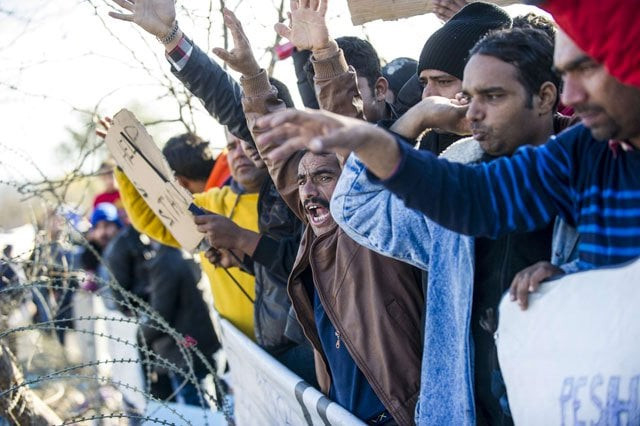This Pakistani travelled to Greece illegally in hopes of a better future
Choudhary Hassan Raza now awaits deportation

PHOTO: AFP
A civil engineer by education, Raza decided to arrive in Europe illegally after he failed to find a decent job in Islamabad. Family expectations to start his career and no openings for fresh graduates were too frustrating for Raza and so he started to look for other opportunities which included leaving Pakistan.
13 Pakistanis deported from Greece
Raza says he did not give up on his job hunt immediately but months of struggle and failure made him realise he should follow his cousin’s footsteps and move to Greece albeit illegally. “My cousin shared the number of a human trafficker who asked for Rs400,000 – paid in two instalments in Turkey and Greece – for the journey,” he reveals.
Raza’s family was reluctant to approve this method but the human trafficker in Turkey and his agent in Hafizabad persuaded them. “They convinced my father that I will be in Turkey in five days and that the journey would not be difficult at all,” Raza shares.
The dreadful path
In May 2016, Raza started his journey from a Lahore train station along with eight other Pakistanis. They travelled to Sibi and then moved to Quetta in a small truck. “We were told not to go to Quetta directly as the chances of getting caught by security personnel were high,” Raza says.
After staying in the provincial capital for a day, the group headed to Dalbandin - an area close to the Iranian border. “There were 25 of us in a minivan. The desert was harsh and the scorching heat made it impossible to breathe in the cramped vehicle. We were sweaty and filthy because of a sandstorm,” Raza recalls.
[brid video="103023" player="7247" title="This Pakistani traveled to Greece illegally in hopes of better future... But now awaits deportation"]
Then came a point when Raza had to part ways with the group and trek alone through mountains for hours. “I saw human bodies and skulls as I walked; the sight made me realise that these were the people who couldn’t make it and I could end up just like them,” he says.
Raza got lost, screamed and cried as he continued his journey for three days. “I wanted to go back but that was not possible. I ran around like a mad man and prayed for help,” he tells us. Following a trail of empty bottles and footprints, Raza finally arrived at the Iranian border from where he tried to reach Taftan – the pre-decided meeting point for all group members.
Unfortunately, Raza only had enough money to get to the next village. There he called his agent in Turkey who advised him to stay put as another group of 12 migrants was arriving at that very location. From there, the group was first transported to Tehran in a van and then to Iran-Turkey border in a car.
“As time passed, I questioned my decision to leave Pakistan more and more,” Raza admits.
He finally entered Turkey and worked there at a construction site for a few days to earn some money before heading to Greece via Turkish city of Izmir. The group had to live in mountains for one long month, helplessly waiting for their agent to arrange a boat to Greece.
“We tried to cross the Aegean Sea in a small tube boat with no life jackets but as soon as we touched international waters, the Turkish Navy caught us and took us back to Izmir. We were released after a few hours and went back to the same mountains. We tried to cross the sea again after a week and this time, fortunately, a rescue mission in Greek waters approached us,” Raza narrates.
There, the boat operator was arrested and thrown into jail and Raza and others were asked to apply for asylum.
Land of nightmares
Greek officials issued Raza a white card (a temporary residence permit) which means he cannot leave the island until his asylum status is cleared. He gets a €90 stipend from the Greek government which he says is not enough to cover even the basic expenses.
Distressed Pakistani asylum seekers rough it out in Sri Lanka
“I wish I hadn’t listened to my cousin. I don’t even blame the human traffickers because it was me who contacted them and paid a huge amount to get here. So far the Greek authorities have sent 100 Pakistanis to Turkey and I know very soon, we would be deported too,” Raza fears.
In a last-ditch effort, Raza plans to slip into Greek capital Athens. “I can hide somewhere in the suburbs and find an illegal job,” he hopes, desperately wanting to send money to his family back in Pakistan.
If Raza decides to go ahead with this plan, he will need money to pay human traffickers who transport migrants in trucks to the mainland. But he also fears the situation might not be different from what he is going through on the island. “I chose to come here to earn a living and for a good life but the reality is different from what I thought it would be. I now wish I had not left Pakistan,” he shares.
In Europe, where there is a massive influx of refugees from war-torn countries, Pakistanis are generally regarded as “economic migrants”. Resultantly, in the past one year, the rate of successful Pakistani asylum claims has fallen below 10 per cent. According to the EU-Turkey controversial deal, Ankara government is bound to accept failed asylum seekers from Greece and Pakistanis make up the majority of those who face deportation.
Atif Tauqeer is a freelance journalist based in Germany.



















COMMENTS
Comments are moderated and generally will be posted if they are on-topic and not abusive.
For more information, please see our Comments FAQ